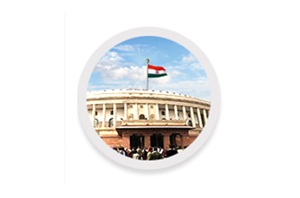The bill that proposes to provide 10 per cent reservation in jobs and education to the economically weaker among the upper castes got Parliament approval with the Rajya Sabha also approving it on Wednesday after the Lok Sabha passed it on the previous day.

The Rajya Sabha passed the Constitution (124th Amendment) Bill, 2019, with 165 'ayes' and seven `nays’ after the Lok Sabha approved it on Tuesday with 323 lawmakers supporting it and only three voting against it.
The quota bill is expected to benefit a huge section of upper castes -- including Brahmins, Rajputs (Thakurs), Jats, Marathas, Bhumihars, and several traders belonging to the Kapu and Kamma communities.
The Rajya Sabha also voted down the demand by some opposition parties that the bill be sent to a select committee for scrutiny. The bill will now have to be signed by the President to become law.
Most parties have called the government's move a political stunt ahead of the national elections. Prime Minister Narendra Modi, who called the law a "victory for social justice", pointed out that elections are held in the country every few months.
"Delighted the Rajya Sabha has passed The Constitution (One Hundred and Twenty-fourth Amendment) Bill, 2019. Glad to see such widespread support for the Bill. The House also witnessed a vibrant debate, where several members expressed their insightful opinions," Prime Minister Narendra Modi tweeted.
Key opposition parties, while supporting the quota for the economically weaker sections, questioned the haste in which bill was drafted and passed. Congress's Kapil Sibal questioned whether it would stand the scrutiny of the Supreme Court, since it exceeds the 50 per cent cap for quota set by the court.
The government has argued that since the bill provides reservation on basis of income, not caste, it was not subject to the 50 per cent bar. There, however, have been instances where an economic bar has been struck down by the Supreme Court and the high courts.
The Aam Aadmi Party said it had boycotted the voting as the bill, in effect, lets down the economically weaker upper castes.
The quota proposal was supported by Lalu Yadav's Rashtriya Janata Dal, the Left Front and Tamil Nadu's opposition DMK.
The bill also exposed rifts within the opposition, which is trying to project a united front to take on the BJP in the national elections late this year. Akhilesh Yadav's Samajwadi Party and Mayawati's Bahujan Samaj Party refused to back the demand for scrutiny by a select parliamentary committee.
Replying to the arguments put forth by the opposition on how the beneficiaries of the new reservation bill shall be decided, union law minister Ravi Shankar Prasad told the Rajya Sabha that the legislation gives powers to the states to decide on the economic criteria for defining the beneficiaries of the tabled quota bill. He said the 10 per cent reservation to poor in the general category will be applicable to jobs in both central and state governments.
The BJP's Jammu and Kashmir unit Wednesday urged the president to extend to the state 10 per cent reservation for the general category poor. Welcoming the passage of the bill in the Lok Sabha, state BJP president Ravinder Raina told reporters that Prime Minister Narendra Modi had fulfilled his promise of empowering all neglected sections of society. "We urge President of India to extend the benefit of 10 per cent reservation to the general category poor living in Jammu and Kashmir as the act cannot be directly implemented here in view of Article 370," he said.




















